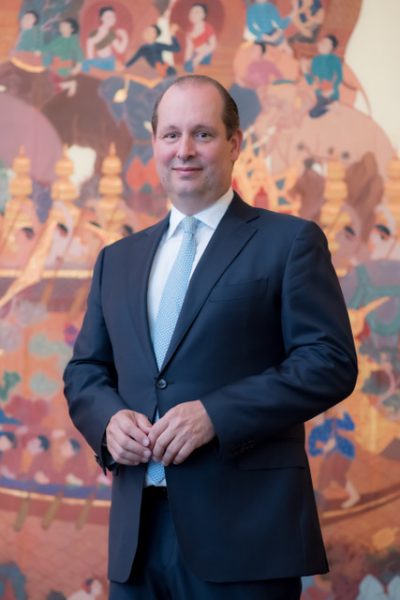BANGKOK, 15 May 2020: More staff, fewer guests and the additional expense of making stays safe are the harsh realities of the new normal according to Minor Hotels senior vice president Asia, Thomas Meier.
In a media video conference, hosted Thursday, Meier concedes that coping with new safety and hygiene regimes will require more staff particularly in housekeeping while the actual capacity of dining venues could fall by 30 to 40% to ensure safe distancing.

More equipment will be needed, including temperature scans and the inclusion of different room amenities such as wipes and gels adding to operational costs.
Some elements of the breakfast buffet may survive as well as the live-kitchen presentation, where chefs will be guarded by a perspex screen and wear protective gear.
As long as Covid-19 remains a threat, guests will view health-safe initiatives as basic essentials when comparing hotels. It will require eliminating risky touchpoints, and that will, in turn, raise operational expenses.
For the guest eliminating risks, could start with a preference to hire a hotel limousine for an airport transfer based on the fleet’s compliance with stricter health standards.
“In reality, occupancy is not an issue for the group’s properties and in the long-run there will be no financial losses,” says Meier. “But it will require more staff as it will take longer to sanitise rooms between check-ins and to maintain a safe environment in dining, meeting and public venues.”
He estimated the new normal would require an 8 to 10% increase in staff to deal with the extra workload, but that would vary between city and resort properties,
“While the outlook is hard to predict (I would need a crystal ball for that) occupancy and operational profits at our key destinations will allow us to catch up on losses.”
Hotels under Minor’s Avani and Anantara brand will not require structural design changes to comply with health and distancing criteria, but they will have to offer guests what Meier called “cocoon space” where they can enjoy privacy and feel secure from Covid-19.
It will require bringing back staff who took leave, including advance leave for 2020. Others are on furlough receiving benefits from government schemes or are benefiting from flat bonus payments to take time off to be with their families.
Once there is more clarity on lifting lockdowns in long-haul source markets leading to the reintroduction of international flights to Asia, hotels will “have a situation where they will need the right people back at work.”
IATA forecasts recovery could be two to three years away. But Meier cautions it could be “too early to form a full picture” until regional and long-haul flights resume, corporate spending returns and countries fully reopen to tourism.
One bright spot, the Maldives is seeing more bookings made by repeat guests from the UK, Germany, Hong Kong and Singapore for stays planned scheduled for January and February 2021.







